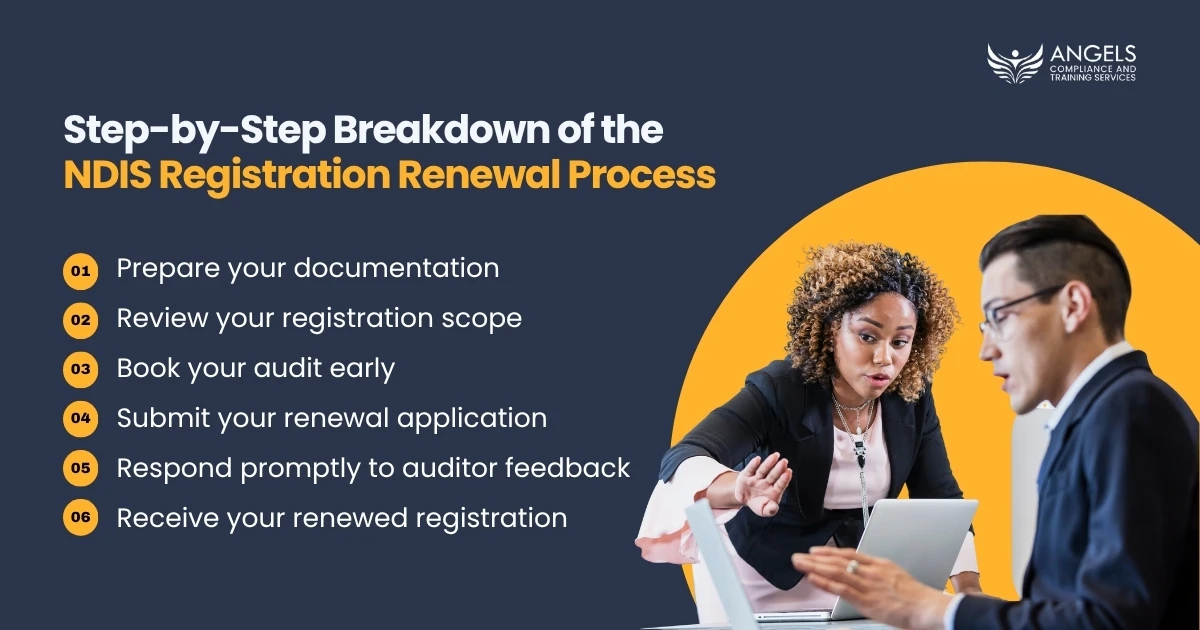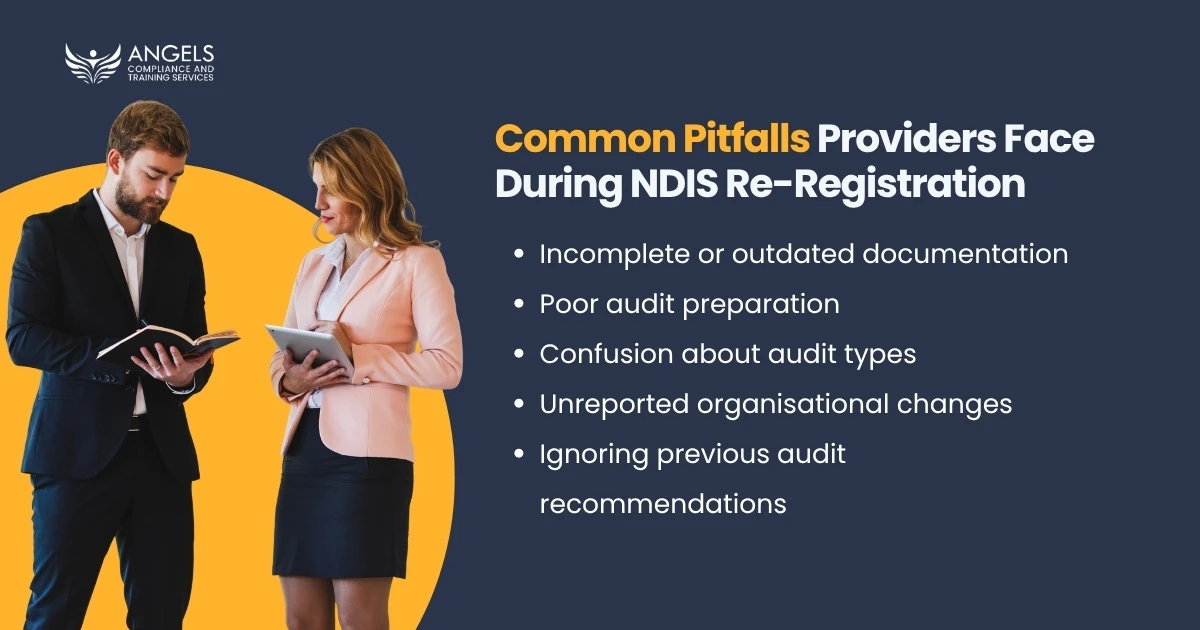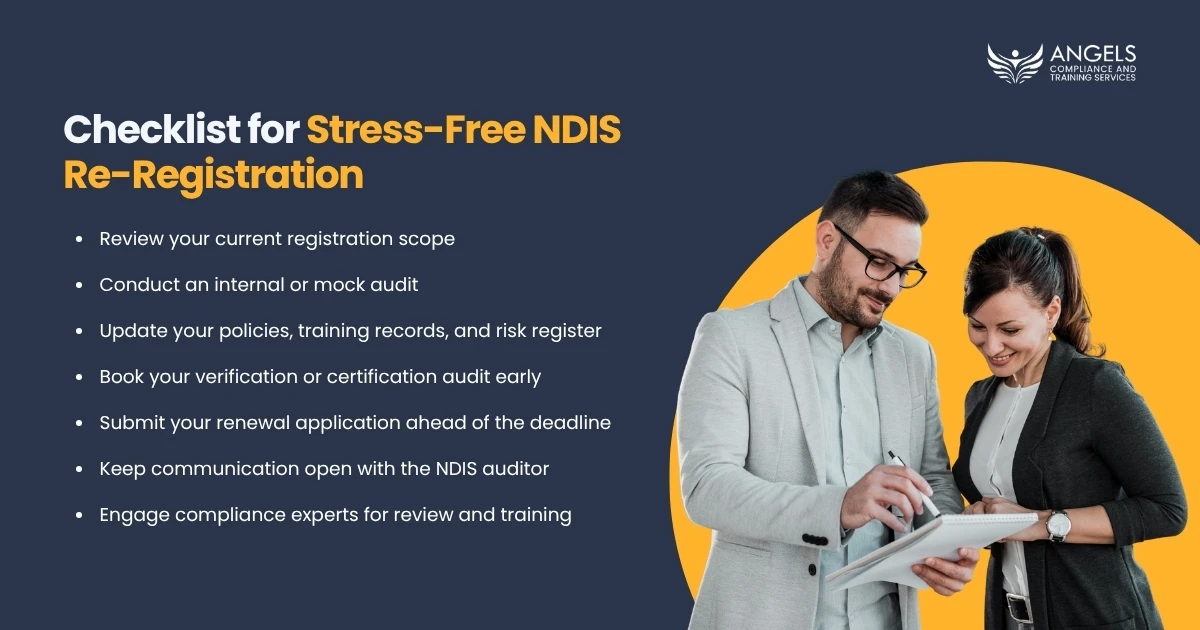Introduction: Understanding NDIS Re-Registration
For NDIS providers, staying compliant isn’t just about meeting regulations; it’s about maintaining trust, safety, and quality for participants who rely on your services. Every three years, registered NDIS providers are required to undergo NDIS re-registration to ensure they continue to meet the NDIS Practice Standards.
But while the renewal process is designed to ensure quality, many providers find it overwhelming. From managing documentation to preparing audits, it’s easy to make mistakes that delay approval or, worse, cause registration lapses.
That’s where expert assistance from Angels Compliance and Training Services can make all the difference. With professional guidance, the NDIS registration renewal process becomes smoother, faster, and stress-free, so you can keep your focus on what truly matters: supporting participants.
When and Why NDIS Re-Registration Is Required
Every NDIS provider’s registration comes with an expiry date, typically three years from the initial approval. Before that date, providers must initiate the NDIS re-registration process to maintain continuity of their services.
Re-registration is required when:
- Your existing registration period is about to expire.
- You’ve made structural or ownership changes to your business.
- Your organisation has expanded or changed its service scope.
Failing to renew on time can result in:
- Suspension or cancellation of your registration.
- Interruption of participant service delivery.
- Loss of funding opportunities through the NDIS.
The renewal process generally takes several months, so starting early is essential. A proactive approach allows you to gather the necessary documentation, prepare for the audit, and address any compliance gaps before submission.
Step-by-Step Breakdown of the NDIS Registration Renewal Process

Renewing your registration involves more than just filling out a form. Here’s how the NDIS registration renewal process typically works:
1. Prepare your documentation
Update your policies, procedures, and training records. Ensure your documentation reflects current NDIS Practice Standards and organisational changes.
2. Review your registration scope
Check whether your service delivery areas or support have changed. Expanding new service types may alter your audit requirements.
3. Book your audit early
Audits can be time-sensitive, and assessors often have waiting lists. Book a verification or certification audit well before your renewal deadline to avoid delays.
4. Submit your renewal application
Log in to the NDIS Commission portal and submit your renewal form with all required evidence. Paying close attention to detailed errors can lead to back-and-forth delays.
5. Respond promptly to auditor feedback
If auditors request clarification or improvements, provide updated evidence quickly. Demonstrating responsiveness helps maintain trust and speed up approval.
6. Receive your renewed registration
Once approved, you’ll receive an updated registration certificate. Keep this record safe; it’s your proof of compliance and eligibility to deliver NDIS-funded services.
Tip: Begin your renewal process at least six months before expiry to stay ahead of deadlines.
Common Pitfalls Providers Face During NDIS Re-Registration

Even the most diligent providers can stumble during the renewal process. Awareness is the first step to prevention, so here are the most common mistakes that delay or derail re-registration.
1. Incomplete or outdated documentation
Outdated policies or missing evidence (such as expired staff qualifications) are among the most frequent causes of renewal delays. Each document should reflect current NDIS standards and operational practices.
2. Poor audit preparation
Providers often wait until the last minute to prepare for audits. Without a mock internal review, compliance gaps can go unnoticed until it’s too late.
3. Confusion about audit types
Many organisations misunderstand the difference between verification (for low-risk providers) and certification (for higher-risk support). Choosing the wrong pathway can extend your approval timeline unnecessarily.
4. Unreported organisational changes
If your company’s structure, key personnel, or services have changed, you must inform the Commission. Failing to update this information can lead to compliance breaches or audit findings.
5. Ignoring previous audit recommendations
The Commission tracks whether you’ve addressed earlier non-conformities. Ignoring prior recommendations signals weak governance and can put your renewal at risk.
Remember: Small oversights can cause big delays reviewing every document, every policy, and every process before submission.
How to Avoid These Mistakes: Proven Tips from Compliance Experts
Preventing pitfalls is easier than fixing them later. Here’s how to streamline your next NDIS re-registration:
a. Conduct regular internal compliance audits
Quarterly reviews help identify issues before they escalate. Use a compliance checklist that covers NDIS Practice Standards, incident management, and governance.
b. Maintain a compliance register
Document all updates to policies, training records, and quality improvements. This acts as your single source of truth during the renewal process.
c. Train your team consistently
Staff knowledge directly impacts compliance. Regular refresher training ensures everyone understands their responsibilities under the NDIS framework.
Keep your risk and incident management systems updated
Your systems should reflect best practice procedures for reporting, mitigating, and reviewing incidents in key focus areas for auditors.
Engage professional support
Partnering with experts like Angels Compliance and Training Services can help you prepare documentation, conduct mock audits, and close compliance gaps before the real audit.
Pro tip: Prevention is always better than panic. A compliance health check can save you from costly delays and potential breaches.
What the NDIS Commission Looks for During Renewal
Understanding what auditors and the Commission prioritise can make your preparation more strategic. Here’s what they typically review:
| Focus Area | What They Expect |
| Documentation | Up-to-date policies, procedures, and evidence of compliance with Practice Standards. |
| Continuous Improvement | Demonstrated systems for learning from incidents and feedback. |
| Staff Competence | Current training records, qualifications, and performance reviews. |
| Participant Safety | Strong risk management and complaint-handling procedures. |
| Governance & Management | Clear roles, decision-making processes, and oversight mechanisms. |
Verification vs Certification
- Verification Audit: For lower risk supports such as therapeutic or early childhood services.
- Certification Audit: For higher risk support like accommodation or complex behaviour support.
Knowing your audit type ensures you meet the right evidence requirements for the first time.
How Angels Compliance and Training Services Can Help
Renewing your NDIS registration doesn’t have to be daunting. At Angels Compliance and Training Services, we specialise in making the process simple, structured, and stress-free.
Here’s how we can support your business:
- End-to-end renewal assistance: From initial document reviews to post-audit submissions.
- Pre-audit gap analysis: We assess your readiness and identify compliance gaps early.
- Comprehensive policy and procedure updates: Ensuring your documentation aligns with current Practice Standards.
- Staff compliance training: Equip your team with up-to-date knowledge on participant safety, incident management, and quality assurance.
- Ongoing monitoring: We track your compliance progress and remind you ahead of future renewals.
With Angels Compliance, you’re not just meeting requirements; you’re building a sustainable, compliant business that stands out for quality and reliability.
Final Checklist for Stress-Free NDIS Re-Registration

Before you begin your renewal, use this quick checklist to ensure nothing is missed:
- Review your current registration scope
- Conduct an internal or mock audit
- Update your policies, training records, and risk register
- Book your verification or certification audit early
- Submit your renewal application ahead of the deadline
- Keep communication open with the NDIS auditor
- Engage compliance experts for review and training
A structured, proactive approach prevents last-minute chaos and strengthens your reputation as a trustworthy provider.
Conclusion: Stay Ahead of Deadlines, Stay Compliant
NDIS re-registration isn’t just a procedural requirement; it’s a reflection of your organisation’s dedication to safe, high-quality disability services. By starting early, keeping your documentation updated, and seeking expert assistance, you can transform renewal from a challenge into an opportunity for growth.
At Angels Compliance and Training Services, we help NDIS providers navigate renewals with ease and confidence. From pre-audit preparation to policy updates and compliance training, our team ensures you meet every requirement on time, every time.
Ready to simplify your NDIS registration renewal?
Contact Angels Compliance and Training Services today and keep your registration secure, your compliance strong, and your focus on where it belongs to your participants.
